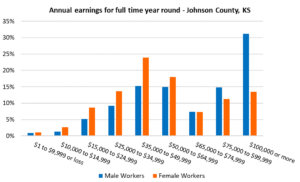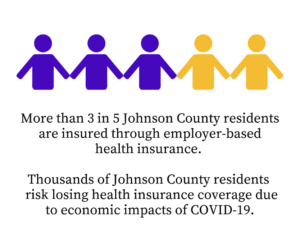Women's Income in Johnson County
As Women's History Month comes to a close, UCS has released new research about the economic experiences of women in our community. Data from the U.S. Census Bureau indicates that nearly 19,700 households in Johnson County are female-headed households. The poverty rate for female-headed households is four times higher than the overall household poverty rate in Johnson County, which may be related to the stark income disparity between men and women. The median family income for female-headed households is approximately 72% of the income for male-headed households, a trend that has been consistent over the past 5 years of available data. Inadequate income impacts a family's ability to provide for basic needs as well as housing choices.
To read the full fact sheet, visit the UCS website.

COVID-19 Highlights the Need for KanCare (Medicaid) Expansion
 As coronavirus spreads in our community forcing some businesses to layoff their workforce, health insurance coverage is potentially at risk for thousands of Johnson County residents. According to data from the U.S. Census Bureau, more than 364,800 residents or 62% of Johnson County residents have employer-based health insurance coverage.
As coronavirus spreads in our community forcing some businesses to layoff their workforce, health insurance coverage is potentially at risk for thousands of Johnson County residents. According to data from the U.S. Census Bureau, more than 364,800 residents or 62% of Johnson County residents have employer-based health insurance coverage.
For workers and residents who do not have employer-provided health insurance, individual health insurance on the ACA Marketplace in Johnson County costs approximately $367 per month (more than $4,000 annually) for a 40-year-old making $45,000 (360% FPL). This price includes the premium tax credit, which is available to those earning between $12,760 - $51,040 per year (100 - 400% of FPL for 2020). Without the credit, the annual cost of coverage for the same individual the on the ACA Marketplace is approximately $5,609 annually, or $467 per month, in addition to deductibles and out of pocket costs.
As of January 2020, Kansas is one of 14 states that has opted not to expand KanCare, the state's Medicaid program. KanCare eligibility currently provides no coverage options for adults without a disability and without children under the age of 18, or for adults with children who make more than 38% of the Federal Poverty Level (FPL). Thirty-eight percent of poverty for a family of three is an annual income $8,253. At the same time, the Affordable Care Act (ACA) Marketplace only offers premium tax credits to households earning at least 138% of FPL, or $29,973 per year for a family of three. Thus, there is a coverage gap for some of Johnson County's lowest income residents-those who make too much to qualify for KanCare, and those who don't make enough to afford a Marketplace policy without the help of a subsidy. Based on U.S. Census Bureau data for 2018, KanCare expansion would offer a path to coverage for more than 10,400 uninsured Johnson County residents with incomes below 138% of poverty - and potentially thousands more who have lost income due to the economic impacts of COVID-19.
Kaiser Family Foundation recently released a study highlighting differences in individuals' ability to access coverage and care amid the COVID-19 public health crisis based on whether or not their state has expanded Medicaid. The survey findings demonstrate how changes under the ACA to expand Medicaid eligibility and streamline enrollment and renewal processes have better positioned the Medicaid program to respond to a public health crisis such as COVID-19. Read the full study findings here.
COVID-19 Emergency Response Funding Available to Johnson County Nonprofits
A coalition of charitable, business and government partners has joined together to create the Kansas City Regional COVID-19 Response and Recovery Fund to respond to the needs of the Kansas City region's most vulnerable communities affected by the COVID-19 pandemic. The Fund will prioritize community-based organizations serving the greater Kansas City region. This includes Johnson County.
Nonprofits can access more information and apply for funding here.

April 1 is Census Day!
The 2020 Census officially kicks off on April 1, 2020. You may have already received instructions for completing you Census at your home address. Don't miss your chance to be counted!
Participation in the 2020 Census is still important. You can be counted even as you practice social distancing by responding online, over the phone or by email - all without having to meet a census taker. The collected data ensures adequate representation in government and that communities receive their fair share of federal funds for important programs for health care, housing, education and nutrition.
Currently, the planned completion date for data collection for the 2020 Census is July 31, 2020. However, that date can and will be adjusted if necessary as the COVID-19 situation evolves in order to achieve a complete and accurate count. For additional information about how the U.S. Census Bureau is adapting 2020 Census operations in response to the COVID-19 outbreak, visit the U.S. Census Bureau website.
For more information on the Census and Johnson County's Complete Count efforts, go to Count Me In JoCo.


